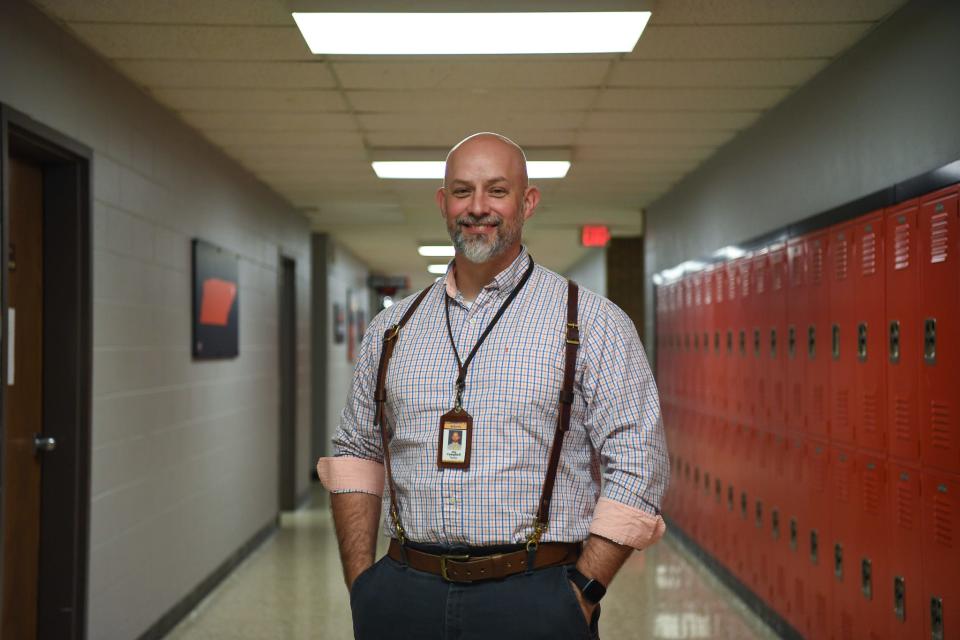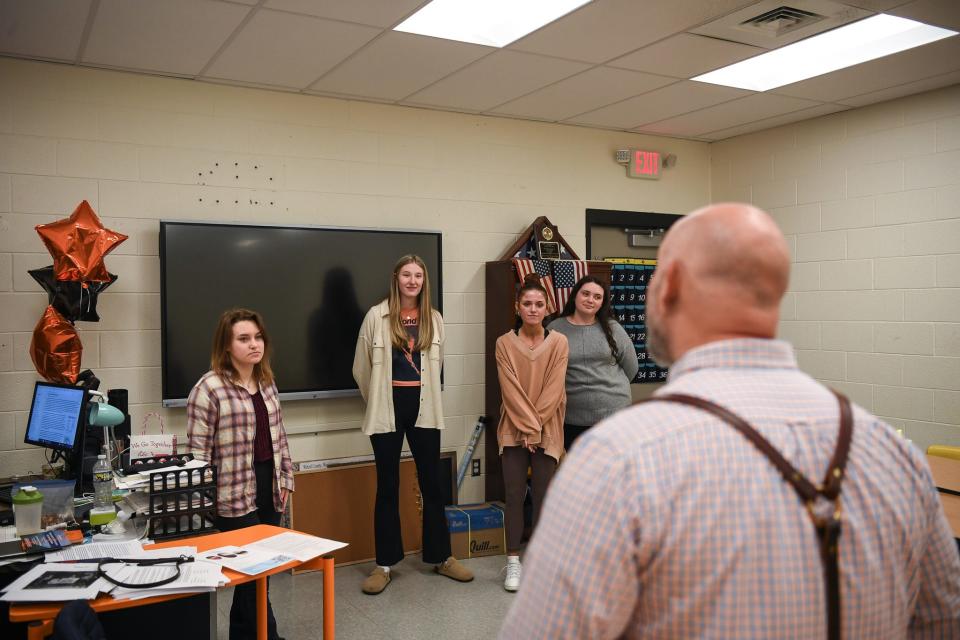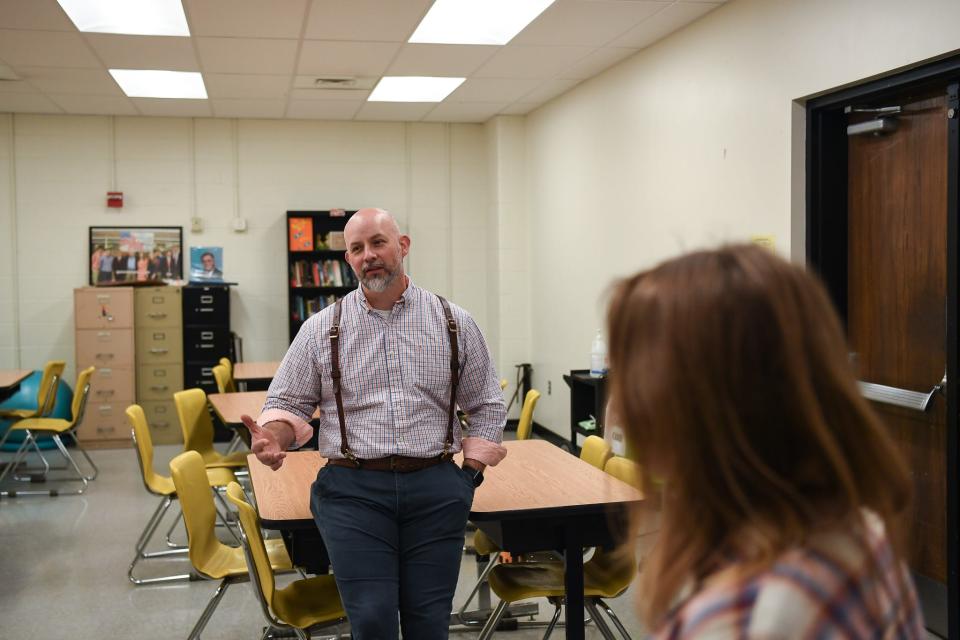Killer class: Meet the Tennessee teens and their teacher who solve decades-old cold cases
The kids in Alex Campbell's class stalked the serial killer like gumshoe sleuths from a paperback novel.
They traipsed around a mountain in East Tennessee looking for a murder weapon. They called the offices of district attorneys to try to get cold cases re-opened. They contacted a knot expert to look at ligature marks on victims' necks. They held news conferences to rally public support for their work hunting a serial killer whose victims — all young women, many of whom were sex workers — were discovered in 1984 and 1985.
Since 2018, Elizabethton High School's social studies classes (those taught by Campbell) have identified victims, worked up profiles that wowed a former FBI special agent and then identified a man they have called a prolific killer. Along the way, they did a side project that helped an innocent woman get out of prison. They even contributed to a couple of podcasts, including one called "Murder 101."
This class project wasn't some academic exercise. This was real life and real death.
After finding answers in one case, in which they linked a long-haul trucker to a 1985 murder, the teacher and students at Elizabethton High believe they have discovered even more truth that law enforcement agencies should confirm. Campbell and his class think they've solved five more cases.
The Tennessee Bureau of Investigation, however, isn't yet ready to agree on the most recent discoveries.
"We are grateful to the students at Elizabethton High School who helped raise awareness about these cases," TBI spokesperson Leslie Earhart said. "In fact, we credit them with bringing renewed public interest to those cases."
Here's what Campbell's class has learned in six years of detective work.
Someone needs to speak up for the victims.
"Those women, although at a low point in their lives ... when they were born, they were the answer to someone's prayers, the greatest thing that had ever happened to some person," said Campbell, who was just a regular social studies teacher until he started dabbling in true crime. "They had hopes and dreams. The hard homes and lives these women experienced tarnished that. But it is sad that at the lowest point in their lives they were frozen in time by this killer.
"They could have gone on to straighten out their lives, like the survivor who went on to become a nurse and grandmother and volunteer for Christian charities. Instead, they were disposed of like trash along the highway, and the authorities threw some of their case files out with their trash ..."
On March 1, state Rep. Jon Holsclaw, R-Elizabethton, honored Campbell and his classes (over six years) with a proclamation highlighting their true crime sleuthing.
All this because a teacher noticed his students were bored.
Murder, he found, isn't boring.
Not a true crime fan
Campbell, 45, has taught social studies for 15 years, and science for seven years before that.
In 2017, he noticed the students in his class basically checked out the last month of school after the state's standardized tests ended.
"Students think school is over," Campbell said.
So he set out to keep them engaged.
He was not a true crime fan. That distinction belonged to his wife, Brittney, who loved the book "Mindhunters" and never missed "Dateline" NBC's shows about murder and mayhem.

One day in the fall of 2017, Campbell teamed up with criminal justice teacher Ryan Presnell and they assigned their classes to write a profile of a killer. They used a real cold case murder from 1982. A woman named Cynthia Taylor had been killed and dumped by the side of the road.
"They worked so hard on those profiles," Campbell said. He noticed how interested and engaged his class became.
The next year, he started the profiling unit with a question: Was there a serial killer active in East Tennessee in the 1980s?
His students dived in. They found more than a dozen unsolved cases, a few of which had been linked in local newspapers. Several of the cases had been called, "The Red-Headed Murders."
"The Red-Headed Murders?" Campbell remembers asking himself. "I had never heard of this."
The students found more than a dozen unsolved cases. They narrowed their list to six that seemed very similar: young, often unidentified sex workers with red hair killed by strangulation and dumped by the side of the road.
"It's insane," said Marlee Mathena, 17, a senior at Elizabethton who wasn't in Campbell's class but has volunteered to work on the profiles in her free time. "I'm alive 30 years later, and I feel like I know them. (The victims) seemed kind of forgotten, and a lot of the girls were close to my age."
The students built a profile that included the unknown killer's signature (ligature from the victim's clothing), modus operandi (picking up women at strip clubs or truck stops), geography (near major highways across several states) and timeline (in 1984 and 1985).
They contacted knot expert Lindsey Philpott who said the bruising on some of the victims' necks was caused by a "granny knot." Significantly, the killer didn't bring a rope. He strangled the women with clothing they had been wearing.
They sent the killer profile to a real FBI investigator, and they waited.
The class gave 'Jane Doe' a name
"Holy cow! This is pretty good," said Scott Barker, 60, a retired FBI agent who, along with investigating bank robberies and public corruption, had reviewed criminal profiles before they were sent to the Behavioral Analysis Unit in Quantico, Virginia. "I would give them an A."
With Barker's support, the class held a news conference in 2018. They gave the killer from their profile a nickname.
The Bible Belt Strangler.
They started working with Shane Waters, the host of a podcast called "Out of the Shadows."

When Waters introduced the class of kid profilers to the world, a listener heard the profile and the stories of the victims. The listener contacted Waters and said one of the Jane Does sounded like the case of Tina Farmer, who had gone missing from Indianapolis in 1984. Tina Farmer's body was found in Campbell County, Tennessee, just off Interstate 75.
"A Jane Doe had a name," Campbell said.
According to Campbell, another woman, who asked that he not to identify her to the media, also came forward and said she had been strangled and dumped by the side of the road.
A man had been convicted in that case for attempted murder. He was in prison.
His name was Jerry Leon Johns.
He fit the profile. White male trucker whose movements in 1984 and 1985 put him in the same proximity as several missing women.
Then there was the confirmation: Jerry Johns' DNA was found on a blanket from the Tina Farmer crime scene. In an email to The Tennessean, the TBI said it had already linked Jerry Johns to Tina Farmer and the unnamed surviving victim in 2016.
But the TBI didn't make their findings public until 2019.
Here's the big twist: Jerry Johns had died in prison.
But that didn't stop Campbell's students.
Visit from a freed prisoner
Campbell's classes don't focus on true crime every semester.
But whenever they show interest, he brings back the Bible Belt Strangler research.
During one of their non-serial-killer semesters, the students at Elizabethton High worked on the case of Suzanne Johnson, who was serving 25-years-to-life for child murder. She had been a babysitter in 1997 when the child she was watching was found dead after the baby's high chair fell over. Johnson said it was an accident.
Police investigators said it was a case of Shaken Baby Syndrome. The students found that the science behind Shaken Baby Syndrome hasn't always been consistent, and has led to convictions being overturned. They found the eye or brain bleeding in the Suzanne Johnson case could have been caused by a fall instead of Shaken Baby Syndrome. The students worked with the California Innocence Project and submitted their findings to both then-Gov. Jerry Brown and current Gov. Gavin Newsom.
Johnson was granted clemency by Newsom in 2020. When she was free she came to Elizabethton High to thank the students.
"I got all those letters, and I thought ... I've got to meet these kids," Johnson said on WBIR-TV at the time.
"I've got some really great students, and they were doing some awesome work," Campbell said.
Closing cases is the goal
Campbell, his students and the former FBI agent who looked at their work believe Johns is responsible for at least six homicides.
"I think Jerry Johns is good for them," Barker said. "He would be my No. 1 suspect."
Campbell was more emphatic.
"He's the only guy in America that fits the profile," Campbell said.

Campbell said the victims are Tina Farmer (Indianapolis, Indiana), Lisa Nichols (West Memphis, Arkansas), Michelle Inman (Nashville), Lorie Ann Pennell (Olive Branch, Mississippi), Tracy Sue Walker (Lafayette, Indiana) and Elizabeth Lamotte (Manchester, New Hampshire).
Campbell said he knows district attorneys won't indict a dead person, but he would like law enforcement agencies to close the cases for each of the six missing women.
So far, he's not getting the closure he's after from law enforcement.
The TBI said it is not currently investigating the cases of Nichols or Pennell.
"Currently, the investigations into the murders of Michelle Inman (identified in 2023), Elizabeth Lamotte (identified in 2018), and Tracy Walker (identified in 2022) remain active and ongoing," said Earhart, the TBI spokesperson. "At this time, there is no evidence to indicate that Jerry Johns is responsible for the deaths of Elizabeth Lamotte or Tracy Walker."
Campbell said he believes the TBI and other law enforcement agencies didn't look into Johns' connections to the other victims because the victims weren't important enough.
"These women weren't worth the effort," he said. "It makes me sick to my stomach. They consider them not worth the trouble."
The TBI disagrees.
"Investigators had no information about each victim’s background, personally or professionally, until they were identified," Earhart said. "We would strongly caution labeling the victims."
That doesn't change Campbell's mind.
"What makes me mad is if you kill the right ones, nobody is going to care," Campbell said. "We can do better than that."
This article originally appeared on Nashville Tennessean: Elizabethton High School students win recognition for solving crimes

